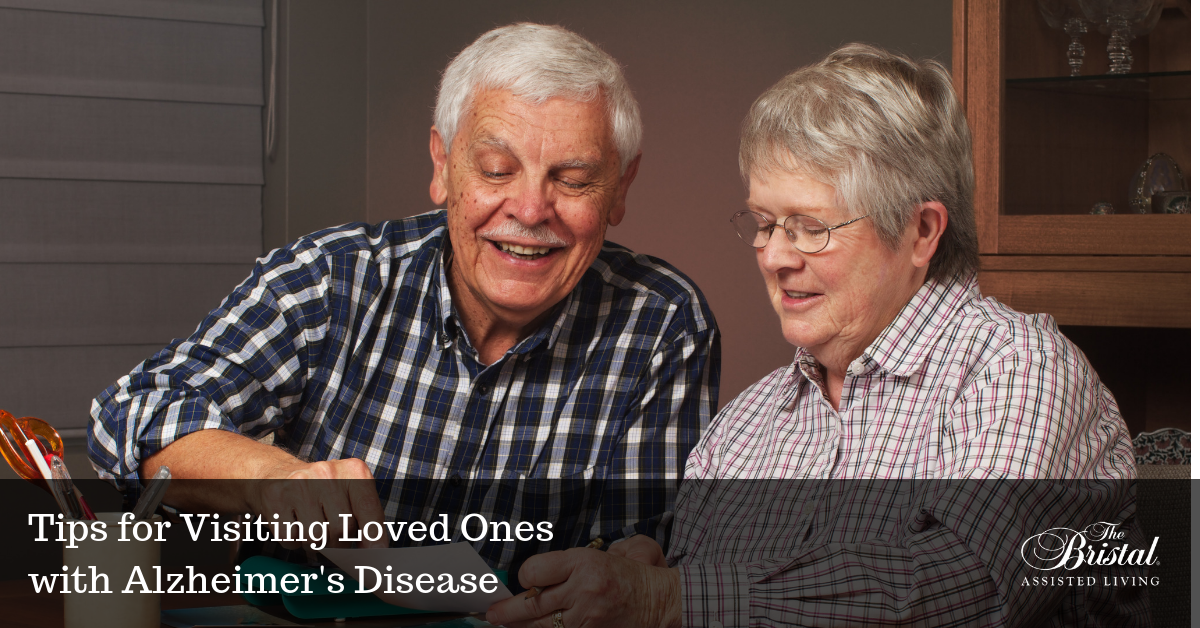Most people with Alzheimer’s disease or another form of dementia undergo behavioral changes during the course of the disease. They may become anxious, repeat the same question or activity over and over again, say outrageous things, or they might not recognize you. These changes can be difficult for the family and make visits with the person challenging.
Here are some Tips for Visiting Loved Ones with Alzheimer’s Disease to make your visit positive and enjoyable:
- Consider their level of ability and interests. Engage them in activities they are interested in and are within their abilities. If your senior loves playing poker – bring a deck of cards. If she loves to garden, bring supplies to start a container garden. Read Gardening Tips for Senior Citizens.
- Keep it simple. Sit outside and enjoy the fresh air.
- Bring a furry friend. If you have a pet, take them along. Spending time with animals offers many health benefits.
- Play “What’s in the bag?” Put some interesting items from their past in a bag. Take the items out one at a time and reminisce.
- Bring a photo album of pictures from their past. Label the pictures with the names of the people in the photos and the story behind it.
- Listen to their favorite music. It’ll do wonders for their physical & mental health.
- Consider time of day. Visit when your loved one is at their best. If you don’t know, ask their primary caregiver.

- If your senior lives at an assisted living community, participate in their recreation activities. Join a book club or run a group. At The Bristal Assisted Living, you’ll find a variety of activities appropriate for the residents’ abilities and interests.
- Go into their world. Try to follow their conversation. If it is difficult to understand, ask them to tell you more or try to pick a word out and use that as a conversation starter.
- Talk about yourself and your family. Always speak in short, simple, sentences at a calm pace. Give your loved one time to process what you say and formulate an answer. They need more time than they used to. Talking too fast and with too many words can be confusing.
- Approach slowly from the front, extend a hand, smile gently and say hello to the person. You might even want to introduce yourself and state what your connection is. For example, “Hi Mary, it’s Jane. I’ve come to visit with you, my favorite aunt.” Then segue into talking about the past – stories that she might remember.
- Try not to ask, “do you remember?”
- Be flexible with their mood changes. Many times if you change your approach, the situation will change.
- Smile and make eye contact.
- Use touch when appropriate.
- Do not try to reason or argue a point. You will not win. Their perception is their reality. If your loved one says you are late, acknowledge their feelings and simply say, “I’m so sorry - traffic was terrible. Next time I will leave earlier so I can spend more time with you.” And gently go toward another topic.
- Leave on a positive note. Don’t say goodbye. Instead say, “I’ll be back.” If there is a history of difficult separation, ask for help. Perhaps a staff member could bring your loved one to a recreational activity.
-
Participate in their recreation activities.
After you leave, think about the visit. Concentrate on the positive and then go and do something nice for yourself.
When visiting your loved one with Alzheimer’s is not possible, consider these options:
Write a letter & enclose a picture of yourself.- Write a letter. Enclose a picture of yourself, a stamped return addressed envelope and paper. You might be surprised with a response.
- Send a care package filled with their favorite things: snacks, music, lotions.
- Record yourself telling a memorable story from their past.
- Order flowers. They will cheer up your loved one’s room.
Maya Angelou says it so beautifully, “I’ve learned that people will forget what you said, people will forget what you did, but people will never forget how you made them feel.”
So with this in mind, prepare a visit that will leave your loved one feeling happy.





